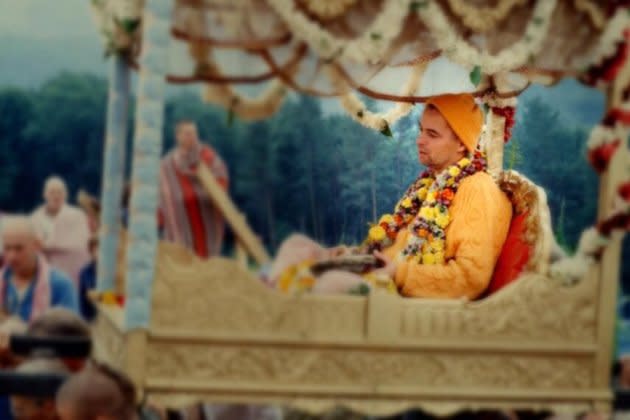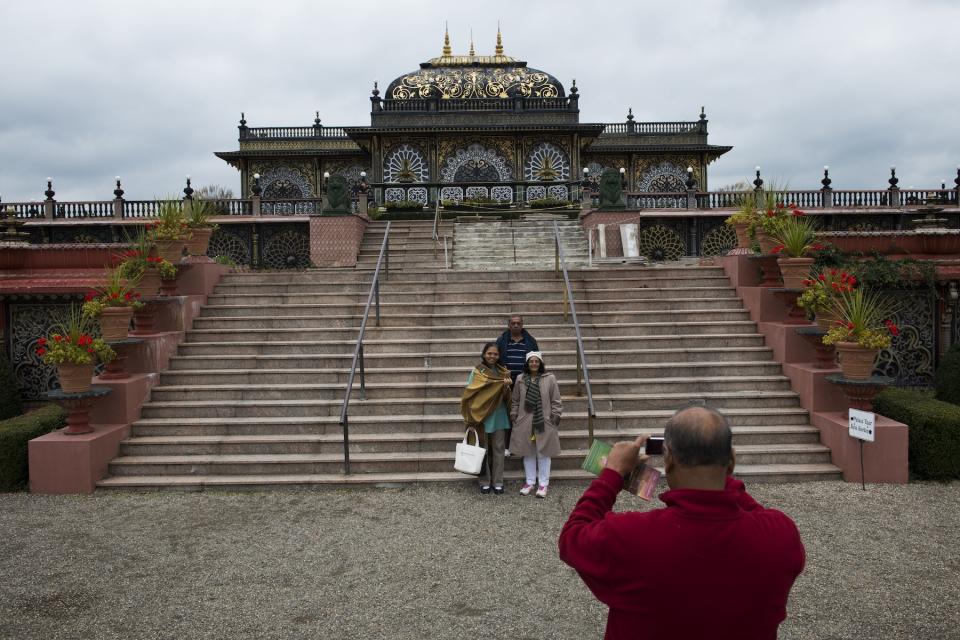The American Guru Who Left a Legacy of Murder, Fraud, and Abuse
- Oops!Something went wrong.Please try again later.
- Oops!Something went wrong.Please try again later.

You might remember them asking for donations at the airport, passing out spiritual pamphlets or chanting hymns in saffron-colored sheets on the streets. Less is known about the Hare Krishna Movement’s ties to counterfeit memorabilia, the sexual assault of minors, and the murder of two former devotees. Hare Krishna, a monotheistic tradition loosely based on Hindu scriptures, is the subject of Peacock’s true crime docuseries Krishnas: Gurus. Karma. Murder., streaming now.
The three-part docuseries delves into the religious organization’s foundational principles of nonviolence, the dissemination of power after the founder’s death, and how one American guru in West Virginia allowed greed and control to get to his head. It’s executive produced by Joseph Freed, Allison Berkley, Tara Long, David Holthouse, and Tim Clancy.
More from Rolling Stone
The Last Beatles Song: 'Now and Then' Is the Fab Four's Final Farewell
How to Get Tickets to the 'Five Nights at Freddy's' Movie Online Now
The organization was founded by A.C. Bhaktivedanta Swami Prabhupada, who traveled to the U.S. in the mid 1960s to spread a message of peace. Eager to expand globally, Prabhupada hooked hippies at concerts on the West Coast and even befriended the Beatles. Captivated by the Hare Krishna chant, fans of the movement began shaving their heads, going drug and alcohol-free, and swapping their Western clothing for draped sheets.
It wasn’t until after leader Prabhupada passed away in 1977 that things began to go south. On his deathbed, Prabhupada renamed gurus globally in order to continue his legacy. One of them was Baptist-raised Keith Ham, or Kirtanananda Swami. He founded New Vrindaban, which grew from a manure-filled mud hole to one of the largest Hare Krishna centers worldwide by 1980.
To help raise money, according to the doc, the women were told to sell counterfeit college sports memorabilia on gameday weekends and collect money under the guise of childrens’ and veterans’ charities. Although the organization celebrated non-materialism, it was also involved in “The Pick,” or selling copyrighted materials that funneled millions into the temple.
Dennis Gorrick, or Dharmatma, led “The Pick” and was physically abusive toward his several sister wives, according to the doc. Christina Autry (Pradhanagopika), a former wife, recalls in the film that Gorrick struck her with coat hangers, a metal nail file, and a rubber hose. Gorrick, who is interviewed in the doc, admits to being “firm” and “heavy-handed” adding, “With the #MeToo movement, women can say anything and it’s for me to prove.”
Diane Gorrick (Dvijapriya Dasi), a sister wife, admits in the doc that she’s still devoted to Gorrick: “I’ve always said I’m going to be with him until we die.”
Children who were sent to boarding school, Gurukula, also experienced physical abuse by their teachers, according to the series, which was prevalent across its global network of schools. Within Krishna Consciousness, devotees were not permitted to be attached to material things, which included children. Berkley, one of the film’s executive producers, struggled to understand the familial structures that encouraged child separation.
“What stood out to me all the time as a female and as a mom was the idea that your kid would not be with you after the age of five,” Berkley tells Rolling Stone. “I can’t even imagine what that would be like.”

In the early Nineties, Ham — who had amassed a fortune worth over $10 million — was indicted for racketeering, mail fraud, and conspiracy to murder two men, Steve Bryant and Charles St. Denis, who blew the whistle on illegal activity and sexual misconduct within New Vrindaban — particularly, they wished to expose Ham’s alleged sexual abuse of young boys. .
Ham “had a propensity for young boys,” according to the docuseries, and after his defense attorney, Alan Dershowitz (who was also a member of the defense teams for Jeffrey Epstein and Harvey Weinstein) argued that his conviction on 9 of 11 charges should be thrown out because the child sexual abuse evidence presented at trial unfairly colored the jury, Ham was released. He was back on trial in 1996, pleaded guilty to one count of racketeering, and ultimately served a shortened sentence due to poor health.
Shockingly, the New Vrindaban temple survived its murder and sexual misconduct controversies and has allegedly reformed the school system. People still worship, sing, and dance at the golden palace of New Vrindaban, executive producer Freed says.
“It is a story that has so many twists and turns that are unbelievable to the point where it almost feels like a scripted movie,” Freed offers.
He compares the religion’s recovery to how Catholicism has endured countless cases of pedophilia. Krishnas: Gurus. Karma. Murder. ultimately explores whether religion and hierarchical power can coexist.
“I hope when people watch it they’ll latch on to the theme behind the murder story — this larger theme about power and corruption and how we always have to be vigilant with people in positions of authority,” explains Freed. “Because it’s a cycle that repeats itself.”
Best of Rolling Stone

